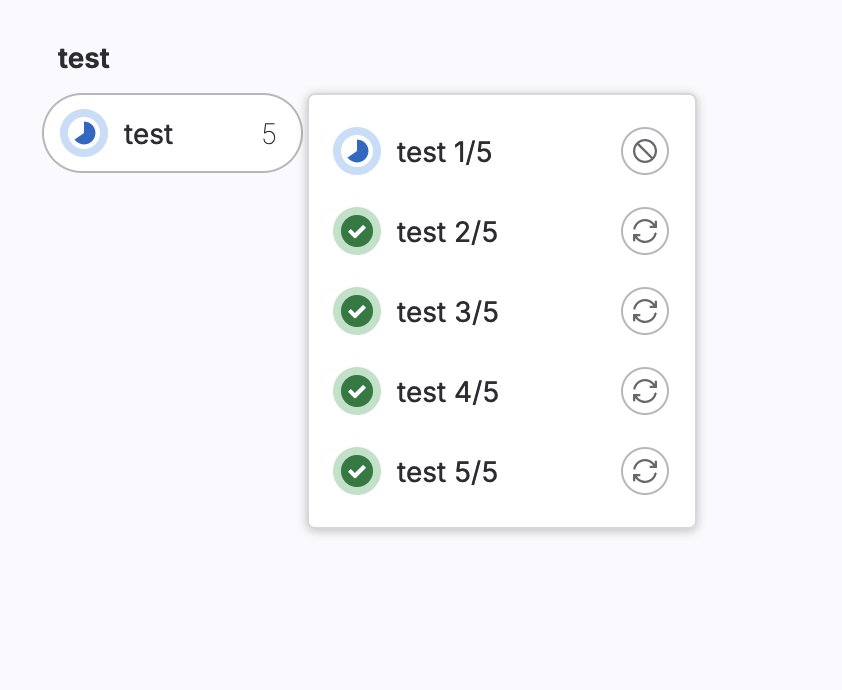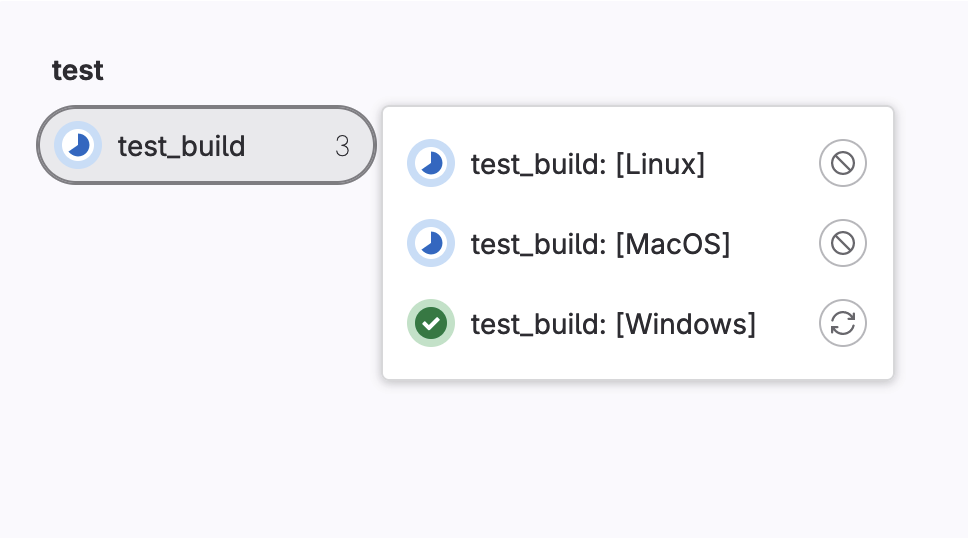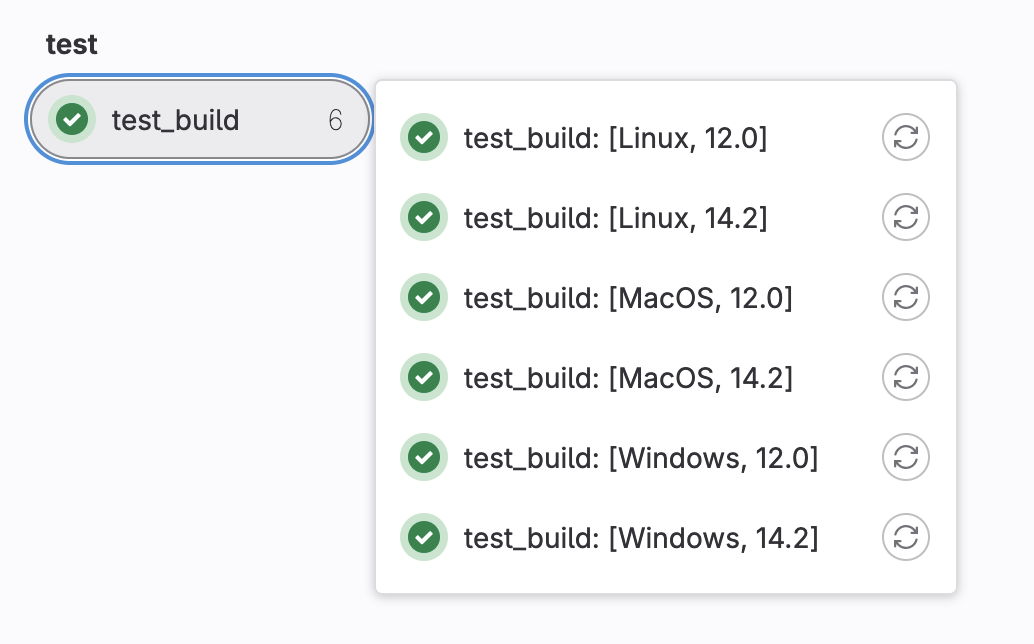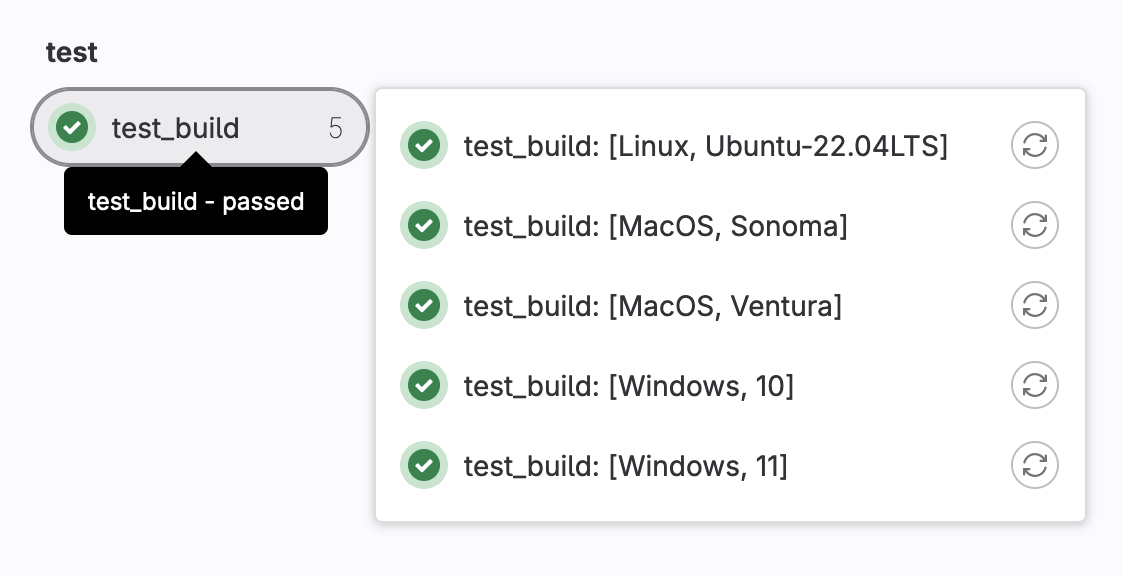Even more builds
Overview
Teaching: 10 min
Exercises: 5 minQuestions
How can we make variations of our builds?
Objectives
Matrix workflows
Making reusable/flexible CI/CD jobs
Parallel and Matrix jobs
Matrices are one of the fundamental concepts of CIs. They allow for flexible workflows that involve building or running scripts with many variations in a few lines. In Gitlab, we need to use the parallel keyword to run a job multiple times in parallel in a single pipeline.
This example creates 5 jobs that run in parallel, named test 1/5 to test 5/5.
test:
script: echo "multiple jobs"
parallel: 5

A pipeline with jobs that use parallel might:
- Create more jobs running in parallel than available runners. Excess jobs are queued and marked pending while waiting for an available runner.
- Create too many jobs, and the pipeline fails with a
job_activity_limit_exceedederror. The maximum number of jobs that can exist in active pipelines is limited at the instance-level.
Matrices
It’s not really useful to simply repeat the same exact job, it is far more useful if each job can be different.
Use parallel:matrix to run a job multiple times in parallel in a single pipeline, but with different variable values for each instance of the job. Some conditions on the possible inputs are:
- The variable names can use only numbers, letters, and underscores
_. - The values must be either a string, or an array of strings.
- The number of permutations cannot exceed 200.
In order to make use of parallel:matrix let’s give a list of dictionaries that simulate a build running on Windows, Linux or MacOS.
test_build:
script:
- echo "My $my_os build"
parallel:
matrix:
- my_os: [Windows,Linux,MacOS]

We can create multiple versions of the build by giving more options. Let’s add a version and give it a list of 2 numbers.
test_build:
script:
- echo "My $my_os build"
parallel:
matrix:
- my_os: [Windows,Linux,MacOS]
version: ["12.0","14.2"]

If you want to specify different OS and version pairs you can do that as well.
test_build:
script:
- echo "My $my_os build"
parallel:
matrix:
- my_os: Windows
version: ["10","11"]
- my_os: Linux
version: "Ubuntu-22.04LTS"
- my_os: MacOS
version: ["Sonoma","Ventura"]

Variables
You might have noticed that we use $my_os in the script above. If we take a look at one of the logs it shows that we have obtained the following output
Executing "step_script" stage of the job script 00:00
$ # INFO: Lowering limit of file descriptors for backwards compatibility. ffi: https://cern.ch/gitlab-runners-limit-file-descriptors # collapsed multi-line command
$ echo "My $my_os build"
My MacOS build
Cleaning up project directory and file based variables 00:01
Job succeeded
What this means is that we can access the values from the variable my_os and do something with it! This is very handy as you will see. Not only can we access values from the yml but we can create global variables that remain constant for the entire process.
Example
variables: global_var: "My global variable" test_build: variables: my_local_var: "My local World" script: - echo "Hello $my_var" - echo "Hello $global_var" - echo "My $my_os build version $version" parallel: matrix: - my_os: Windows version: ["10","11"] - my_os: Linux version: "Ubuntu-22.04LTS" - my_os: MacOS version: ["Sonoma","Ventura"]
Mix it all up and write less code!
Let’s now mix the usage of parallel jobs and the the fact that we can exctrat values from variables we defined. Let’s try implementing this with the config file we’ve been developing so far.
Remember what we have so far
hello_world: script: - echo "Hello World" .template_build: before_script: - wget https://github.com/conda-forge/miniforge/releases/latest/download/Miniforge3-Linux-x86_64.sh -O ~/miniconda.sh - bash ~/miniconda.sh -b -p $HOME/miniconda - eval "$(~/miniconda/bin/conda shell.bash hook)" - conda init build_skim: extends: .template_build script: - conda install root=6.28 --yes - COMPILER=$(root-config --cxx) - FLAGS=$(root-config --cflags --libs) - $COMPILER -g -O3 -Wall -Wextra -Wpedantic -o skim skim.cxx $FLAGS build_skim_latest: extends: .template_build script: - conda install root --yes - COMPILER=$(root-config --cxx) - FLAGS=$(root-config --cflags --libs) - $COMPILER -g -O3 -Wall -Wextra -Wpedantic -o skim skim.cxx $FLAGS allow_failure: yes
Now let’s apply what we learned to refactor and reduce the code all into a single job named multi_build.
hello_world:
script:
- echo "Hello World"
.template_build:
before_script:
- wget https://github.com/conda-forge/miniforge/releases/latest/download/Miniforge3-Linux-x86_64.sh -O ~/miniconda.sh
- bash ~/miniconda.sh -b -p $HOME/miniconda
- eval "$(~/miniconda/bin/conda shell.bash hook)"
- conda init
- conda install $ROOT_VERS --yes
- COMPILER=$(root-config --cxx)
- FLAGS=$(root-config --cflags --libs)
script:
- $COMPILER -g -O3 -Wall -Wextra -Wpedantic -o skim skim.cxx $FLAGS
multi_build:
extends: .template_build
parallel:
matrix:
- ROOT_VERS: ["root=6.28","root"]
Note
- We have only defined a
ROOT_VERSlist and we use this in thebefore_scriptsection to setup the intalation of ROOT. After testing it we can see that this works and we’ve been able to reduce the amount of text a lot more.- We have dropped the
allow_failure: yesfor now because we’re feeling confident.- We have factored out the
before_scriptand thescriptinto our.build_template.
Key Points
Matrices can help make many builds with variations
Use Variables whenever it’s convenient